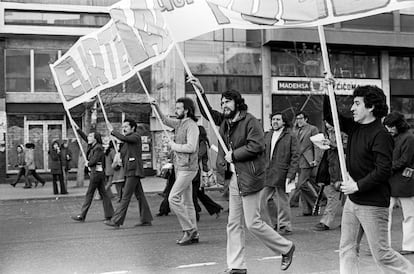Songs for the revolution: Víctor Jara and his universal legacy
The Chilean songwriter was politically committed until the end, when he was murdered by the Pinochet dictatorship’s soldiers

Santiago, Chile – September 5, 1972. The day before, nearly 8% of Chile’s 10 million citizens had celebrated the second anniversary of President Salvador Allende’s election victory. On this day, the Communist Youth of Chile (JJCC) was kicking off its seventh annual congress in the old parliament building in downtown Santiago with delegations from 38 countries. The JJCC’s central committee had been recently expanded to 80 members, and now included composer Isabel Parra (daughter of Violeta, also a composer); Eduardo Carrasco (of the Quilapayún musical group); and singer-songwriter Víctor Jara, who had just released his La población [The People] album with the Dicap label (established in 1968 by the JJCC).
Jara had been a communist activist since the late 1950s, when he was taking acting classes at the University of Chile’s Experimental Theater and playing with the Cuncumén folk group. Many of Chile’s leading intellectuals had flocked to the communist party at the time: poets Pablo Neruda and Juvencio Valle; novelist Francisco Coloane; symphony conductor Armando Carvajal; soprano Blanca Hauser; actors Roberto Parada and María Maluenda; choreographer Patricio Bunster; and theater director Pedro de la Barra.
Only once did Jara publicly explain his political convictions. In a 1971 interview with El Musiquero magazine, Jara said: “I always identified with political activism. When I listened to speeches about the people’s struggles, I identified with them. I was raised in a humble home, an experience that enabled me to appreciate injustice and misery, and helped me understand who I am.” Born in Santiago de Chile on September 28, 1932, Víctor was the fourth of six children born to Manuel Jara and Amanda Martínez. Soon after his birth, the family left the city to work in almost feudal servitude as landless peasants in Quiriquina, near Chillán (central Chile). Jara grew up in poverty as the family moved around the country and eventually settled on the outskirts of Santiago de Chile in 1943. “When we ate meat, it was a party. But I didn’t know why until much later,” he told Paula magazine in 1971.
In early 1970, his politics led him to quit a steady job as a theater director at the University of Chile, where he had earned some renown for directing plays written by his friend, Alejandro Sieveking (Ánimas de día claro and La remolienda); The Invaders by Egon Wolff; and The Caucasian Chalk Circle by Bertolt Brecht. But his success as a solo singer-songwriter led him to pursue a career in music. Songs like El cigarrito, El aparecido and Pongo en tus manos abiertas became very popular, and he won the first Festival of the New Chilean Song in 1969 for Plegaria a un labrador. When Salvador Allende launched his campaign in 1970 as the Popular Unity movement’s (UP) presidential candidate in 1970, Jara used his guitar and songs to rally support for the UP. He composed Venceremos [We Will Triumph] with composer Sergio Ortega and others, a song that became an anthem of global leftist movements.
“What would you have done when Allende won that night?” he wrote on September 23, 1970, to his friend Rubén Ortiz, a Mexican musician. “I’m sure the same thing we all did — cry, jump, run, sing, shout, and experience the greatest joy Santiago had ever seen. Little brother, so many years of delay, misery and deceit. That night, I was standing next to some Popular Unity leaders, and they couldn’t believe it was true — we had defeated the reactionaries and the Americans...”
For the next three years, Víctor Jara supported Allende as a creator and communist activist, as the UP movement built a socialist government that respected political pluralism, human rights and democratic values. He performed throughout Latin America — Mexico, Costa Rica, Venezuela, Colombia, Argentina, Panama, Cuba and Peru — and in the USSR and United Kingdom. His concerts inspired a global groundswell of support for the UP, while his tribute to Ho Chi Minh and the Vietnamese people, El derecho de vivir en paz [The right to live in peace], fueled anti-war sentiment around the world. His popular song aimed at all the political fence-sitters (Ni chicha ni limoná) again revealed his activist heart, and his most universal song, Te recuerdo, Amanda, spoke to all the strong mothers who raised children on their own.
Chile’s widening polarization after 1972 brought out pessimistic and melancholic tones in his correspondence and songs. “Will we live to see the achievements of socialism?” he wrote in a letter to Peruvian poet Arturo Corcuera on June 2, 1972. In his 1973 song, Cuando voy al trabajo, Jara sings, “I’m writing the beginning of a story / without knowing how it ends.”
Early on September 11, 1973, Jara heard the news of the coup d’état led by General Augusto Pinochet. When President Allende spoke from La Moneda Palace and exhorted the Chilean people to gather in protest at their workplaces, Jara headed to the public university (Universidad Técnica del Estado) where he worked in an extension department, passing the Communist Youth of Chile headquarters on the way. Jara and 1,000 others stayed at the university all day and night until the army stormed the campus at dawn. He and other “prisoners of war” were taken to the Estadio Chile sports complex, where they were interrogated and beaten.
On September 15, a hungry, thirsty and injured Jara sat on the bleachers of the sports complex that was later named after him, and began writing a long and moving poem. He handed the unfinished poem to some friends before soldiers took him and a friend, Littré Quiroga, to a locker room and shot them. A year later, his exiled widow, Joan Jara, released a posthumous album that included Manifiesto, a song composed weeks before the coup that amply illustrated Victor’s ethical, aesthetic and political convictions: “I sing this song from the scaffolding we built to reach the stars...”
Sign up for our weekly newsletter to get more English-language news coverage from EL PAÍS USA Edition
Tu suscripción se está usando en otro dispositivo
¿Quieres añadir otro usuario a tu suscripción?
Si continúas leyendo en este dispositivo, no se podrá leer en el otro.
FlechaTu suscripción se está usando en otro dispositivo y solo puedes acceder a EL PAÍS desde un dispositivo a la vez.
Si quieres compartir tu cuenta, cambia tu suscripción a la modalidad Premium, así podrás añadir otro usuario. Cada uno accederá con su propia cuenta de email, lo que os permitirá personalizar vuestra experiencia en EL PAÍS.
¿Tienes una suscripción de empresa? Accede aquí para contratar más cuentas.
En el caso de no saber quién está usando tu cuenta, te recomendamos cambiar tu contraseña aquí.
Si decides continuar compartiendo tu cuenta, este mensaje se mostrará en tu dispositivo y en el de la otra persona que está usando tu cuenta de forma indefinida, afectando a tu experiencia de lectura. Puedes consultar aquí los términos y condiciones de la suscripción digital.









































